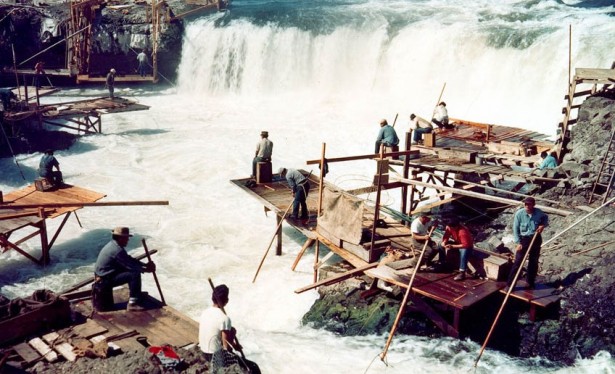forum
library
tutorial
contact

Tipping the Balance in Favor of Salmon
by Todd J. BroadmanMoscow-Pullman Daily News, April 2, 2019
|
the film forum library tutorial contact |

|
Tipping the Balance in Favor of Salmonby Todd J. BroadmanMoscow-Pullman Daily News, April 2, 2019 |
BPA currently sells its power to some 135 public utility districts for $36 per megawatt,
power that can be bought on the open market for around $20.
 The plight of salmon in Pacific Northwest has captured my attention. Salmon are referred to as a keystone species.
The plight of salmon in Pacific Northwest has captured my attention. Salmon are referred to as a keystone species.
There is a profound intelligence and sublime interplay between salmon and the abundance of plant and animal species that call the Columbia River basin home. The basis is an area the size of France - some 60 million years in the making. Our cells are somehow woven into the fabric of these mountains and valleys.
We can feel it in the snowmelt of spring; we can observe it too: in the hundreds, thousands of floating salmon corpses at the base of dams or in estuaries long before reaching their first "border wall." What we do notice tugs at fundamental questions - if we assume ourselves to be a keystone species as well.
Just what sets humans apart from other species? Many have taken a stab at this somewhat worn out question. Sophisticated communication must be the answer. Or is it how we organize learning? Let's not waste any more time on this one - the answer is plain (or plaintiff) enough: we are the only species that litigates.
While our cells call us to nature, our heads are firmly planted (yes, there too) in paperwork: policies, procedures, committees and courtrooms.
More broadly, we've demonstrated an infinite capacity to disagree with one another. And nowhere has that been made more apparent than how we go about making decisions that impact our living environment: that natural interplay of living systems.
Back to that discomforting scene: we zoom-in on a Chinook salmon taking its last few reflexive gasps at the base of the Lower Granite dam.
Energy hungry hydroelectric consumers like myself rely on perspective, though. And to nourish us with perspective, we must roam the genteel halls of Bonneville Power Administration's Portland headquarters. BPA is a federal agency created as part of the New Deal in 1937. Under current administration are 31 dams in the Columbia basin that generate about a third of the Northwest's electric power.
BPA's lead administrator, Elliot Mainzer, "is proud of how BPA is balancing energy and environmental priorities to continue its role as an economic engine of the Pacific Northwest." Though "balance" may not exactly resonate with the weary Chinook, nine populations of which are listed as endangered, it is the kind of pablum we expect from handsomely paid professional paper pushers. (Half of BPA's 2,891 employees have salaries that exceed $100,000).
If I were to attempt to "balance" my cynicism, it would be to lend some historical credibility to BPA's role in helping to pull this region out of an economic depression. And after all, hydroelectric energy is touted as carbon-free.
Economic conditions and technology, though, as activist and writer Linwood Laughy points out, have changed the equation significantly. BPA currently sells its power to some 135 public utility districts for $36 per megawatt, power that can be bought on the open market for around $20. The enormous costs of operating and upgrading old dams may turn into BPA's "death spiral."
Meanwhile, there is another death spiral that doesn't quite pencil-out: 28 of 49 salmon stocks listed as threatened or endangered. The Snake River sockeye is on "biological life support" according to the Idaho Fish and Game Department. And what dams take away, our ingenuity in the form of hatcheries must supplant - to meet our recreational and commercial fishing requirements 80% of river salmon are bred in hatcheries.
Society's rapacious appetite for more and more energy to enable our flat screens and freezers, and its role in what we term progress, is an underlying assumption in this elusive "balance" that occupies mountains of court depositions and policy papers. What will be absent from the board meeting agenda, and set aside as seemingly irrelevant, is our spiritual inheritance, our spiritual connection.
And yet we hear this from a 1905 Supreme Court ruling regarding the role of salmon to Native Americans along the Columbia: "(salmon are) not much less necessary to the existence of the Indians than the atmosphere they breathed."
In the end, our administrative chess players will achieve a balance, everyone's paychecks will arrive on time, and we'll get comfy with a bowl popcorn to watch the latest nature documentary on Netflix - probably about salmon.
learn more on topics covered in the film
see the video
read the script
learn the songs
discussion forum
